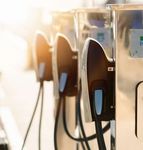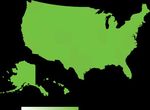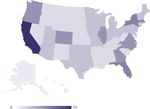Getting ready for the second wave of electrification - Urban ...
←
→
Page content transcription
If your browser does not render page correctly, please read the page content below
Getting ready for the second wave
of electrification.
The powerful forces driving the electrification trend.
The second wave of electrification is gaining momentum from both the public and private sectors.
Investments made today in the nation’s electrification infrastructure promise significant dividends when
electrification scales up to reach these second-wave buyers. The question isn’t if the second wave is coming;
it’s when. Unfortunately, there isn’t one answer to that question. Much of it depends on who’s asking the
question, where they are located geographically, and what auto manufacturer they are referring to.
Charging stations: the electrification
elephant in the room.
Charging stations represent the tipping point for
electrification. “Charging is the big challenge right
now,” said Joe Wiesenfelder, executive editor at Cars.
com.1 “People will want to charge at home, overnight,
then unplug and drive. At-home charging doesn’t work
in every home without modification. And once on the
road and needing a charge, even fast-charging batteries
aren’t as fast as the five minutes consumers are used to
spending at a gas station.”
The Federal Government, under the new Biden
Administration, has plans to rectify that situation. It
has pledged 500,000 EV charging stations by 2030.
To put that in perspective, as of the end of 2020, there
were 30,451 EV public charging stations in the United
States, with 96,536 public charging ports,2 compared to
115,000 gas stations.3
© 2021 Urban Science. All rights reserved.The Biden
Administration has
pledged 500,000 EV
charging stations by
2030, up from 30,451
at the end of 2020.
Vehicle manufacturers are also getting into the charging station business, trying to play catch-up
to the significant lead Tesla has built up with a strategy that, from the beginning, embraced the
need for a strong charging station infrastructure. General Motors is working with electric vehicle
charging operator EVgo Services to build 2,750 fast chargers in cities and suburbs across the U.S.4
Electrify America, a subsidiary of Volkswagen Group of America, is investing more than $2 billion
over 10 years in zero-emissions vehicle infrastructure, and it expects to have 800 total charging
stations with about 3,500 DC fast chargers by the end of 2021.5
In early March of this year, a coalition of six
electric utilities announced a new initiative to
build a seamless network of charging stations
in and around the southeastern United States.6
The group plans to build chargers near major
highways in every southern state, stretching as
far west as Texas and as far north as Indiana,
Ohio, and Virginia.
Significant incentives are also encouraging
third parties to get in on building charging
stations. The 30C Tax Credit7 – which covers
30% of a qualified property, up to $30,000
for businesses per location and $1,000 for
a taxpayer’s primary residence – has been
extended through Dec. 31, 2021.8
© 2021 Urban Science. All rights reserved.Why “apples-to-apples” comparisons
won’t work for electrification.
Vehicle manufacturers face different challenges, depending upon where their dealerships, current
customers and potential customers are located. The two maps below illustrate how the number of
electric vehicle charging stations is driven by electric vehicle laws and regulations. California (home
to Tesla), has a whopping 117 laws and incentives for electric vehicles. This has led to California,
with just 12% of the nation’s population, having a third of the nation’s charging outlets.9
Electric Vehicle Charging Electric Vehicle Laws and
Outlets by State Incentives by State
Public Charging Outlets
Private Charging Outlets
Source: AFDC Alternative Fueling Station Locator Data (/locator/stations/) Source: AFDC Laws and Incentives Data (/laws/).
© 2021 Urban Science. All rights reserved.Electric vehicle registrations by state paint similar pictures. California, Washington, Florida, Texas,
New York, and Arizona lead the pack, reflective once again, of the charging station infrastructure in
those states.10 Compare that to the top 10 U.S. EV registrations by vehicle make and model, and the
extent of the network challenge begins to take shape.11
2020 BEV Retail Sales by State
100000
90000
80000
BEV Retail Sales
70000
60000
50000 2019 211,954
40000
2020 242,123
30000
Change +14.2
20000
10000
0
CA FL TX NY NJ WA IL CO MA PA AZ VA NC MD GA OH OR MI NV CT MN HI TN UT MO IN WI SC AL KY KS LA OK NH DC VT IA ME RI NM NE DE AR ID MS WV MT PR AK SD WY ND
2020 Top 10 U.S. EV Registrations
1. Tesla Model 3 95,135
2. Tesla Model Y 71,344
3. Chevrolet Bolt EV 19,664
4. Tesla Model X 19,652
5. Tesla Model S 14,430
6. Nissan Leaf 8,972
7. Audi E-tron 7,089
8. Porsche Taycan 3,943
9. Hyundai Kona 2,964
10. Kia Niro 2,807
Source: Experian
© 2021 Urban Science. All rights reserved.Understanding convenience in an electrified world.
Right now, it’s the wild west for electrification. Charging
stations appear to be built where it is easiest or feasible.
Construction is heavily influenced by local incentives
and rebates, without consideration to those who need
charging close to home or work. A constant regarding
the planning of any network, which seems to have been
partially lost on EV thus far, is what lies at its core: the
necessity to plan around the concept of convenience.
Today, the definition of convenience is evolving to
encompass a greater set of criteria, including convenience
to charging – further exemplifying why it’s necessary to
plan strategically to ensure your customers have access
to what they need, where they need it. The same science
used to create the most efficient networks possible can
be applied to solve this challenge.
The pandemic that impacted 2020 demonstrated the
auto industry’s ability to pivot, innovate, and rise up
to the challenge. Electrification offers a different type
of challenge, one that – unlike the pandemic – can be
planned for. Different manufacturers, each with different
challenges revolving around their specific customers,
need to carefully choose their particular EV strategies.
The time to ask questions, get answers, and act is now…
before the second wave is upon us in full force.
The objective power of science.
It all comes back to the science. Since our founding, we’ve been a force for change. Our process of looking
beyond what we know to what we discover through science continues to serve us and our clients very well.
At Urban Science, we pioneered a proven, scientific approach to planning, and have continued to advance
and innovate our methodology for over 40 years of automotive industry changes and advances. It’s an
approach that has stayed ahead of the technological curve to help OEMs improve the performance of their
dealership networks, and continues to be the industry standard.
Simon Bradley
To learn more about optimizing your Global Practice Director – Network, Urban Science
Network Planning, call or email me. slbradley@urbanscience.com
+1-562-988-4262
1
The Big Challenge to Biden’s Electric Vehicle Pledge – Not Every State is On Board, https://www.marketwatch.com/story/the-big-challenge-to-bidens-electric-vehicle-pledge-every-state-is-different-11612389231 | 2US Public Charging Locations and Ports: Dec 31, 2020, https://
evadoption.com/ev-charging-stations-statistics/ | 3How Many Gas Stations Are In U.S.? How Many Will There Be In 10 years? https://www.marketwatch.com/story/how-many-gas-stations-are-in-us-how-many-will-there-be-in-10-years-2020-02-16 | 4GM to Build Nationwide EV
Charging Network, https://www.ttnews.com/articles/gm-build-nationwide-ev-charging-network | 5Biden Infrastructure Plan Pushes Better Roads, EV Chargers, Mass Transit, https://www.forbes.com/wheels/news/biden-infrastructure-plan-better-roads-ev-chargers-mass-transit/
| 6AEP, Five Others Plan to Add EV Fast Chargers Creating Electric Highway Coalition, https://www.aep.com/news/releases/read/6036/AEP,-Five-Others-Plan-to-Add-EV-Fast-Chargers-Creating-Electric-Highway-Coalition | 7https://www.chargepoint.com/incentives/feder-
al-tax-credit/#:~:text=What%20is%20the%2030C%20EV,to%20the%20end%20of%202021. | 8The 2020 30C Tax Credit Has Been Extended Through 2021, https://www.evconnect.com/incentives?utm_source=adwords&utm_medium=ppc&utm_campaign=CT-AA-Dynamic+-
Search&utm_term=&hsa_tgt=dsa-392257878405&hsa_grp=105392027735&hsa_mt=b&hsa_cam=10641953406&hsa_ver=3&hsa_src=g&hsa_net=adwords&hsa_kw=&hsa_acc=7281861922&hsa_ad=451180202118&gclid=CjwKCAiAp4KCBhB6EiwAxRxbpImHhj4cwVWkE0Z-
JCaW3gTZd1xwP_q1iZ-TWnnr8rfmI8SMIOf91OxoCVvcQAvD_BwE | 9U.S. Department of Energy, Alternative Fuels Data Center, Maps, https://afdc.energy.gov/data/10366 | 10U.S. Department of Energy, Alternative Fuels Data Center, Vehicle Registrations by State, https://afdc.
energy.gov/data/10366 | 11Automotive News/Experian, https://www.autonews.com/mobility-report/teslas-commanding-lead-us-evs-illustrated-registration-report
© 2021 Urban Science. All rights reserved.You can also read


























































